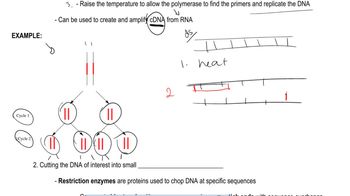Table of contents
- 1. Introduction to Genetics51m
- 2. Mendel's Laws of Inheritance3h 37m
- 3. Extensions to Mendelian Inheritance2h 41m
- 4. Genetic Mapping and Linkage2h 28m
- 5. Genetics of Bacteria and Viruses1h 21m
- 6. Chromosomal Variation1h 48m
- 7. DNA and Chromosome Structure56m
- 8. DNA Replication1h 10m
- 9. Mitosis and Meiosis1h 34m
- 10. Transcription1h 0m
- 11. Translation58m
- 12. Gene Regulation in Prokaryotes1h 19m
- 13. Gene Regulation in Eukaryotes44m
- 14. Genetic Control of Development44m
- 15. Genomes and Genomics1h 50m
- 16. Transposable Elements47m
- 17. Mutation, Repair, and Recombination1h 6m
- 18. Molecular Genetic Tools19m
- 19. Cancer Genetics29m
- 20. Quantitative Genetics1h 26m
- 21. Population Genetics50m
- 22. Evolutionary Genetics29m
18. Molecular Genetic Tools
Genetic Cloning
Problem 33b
Textbook Question
Textbook QuestionThe U.S. Department of Justice has established a database that catalogs PCR amplification products from short tandem repeats of the Y chromosome (Y-STRs) in humans. The database contains polymorphisms of five U.S. ethnic groups (African-Americans, European Americans, Hispanics, Native Americans, and Asian-Americans) as well as the worldwide population.
For forensic applications, the probability of a 'match' for a crime scene DNA sample and a suspect's DNA often culminates in a guilty or innocent verdict. How is a 'match' determined, and what are the uses and limitations of such probabilities?
 Verified Solution
Verified SolutionThis video solution was recommended by our tutors as helpful for the problem above
Video duration:
2mPlay a video:
217
views
Was this helpful?
Related Videos
Related Practice

